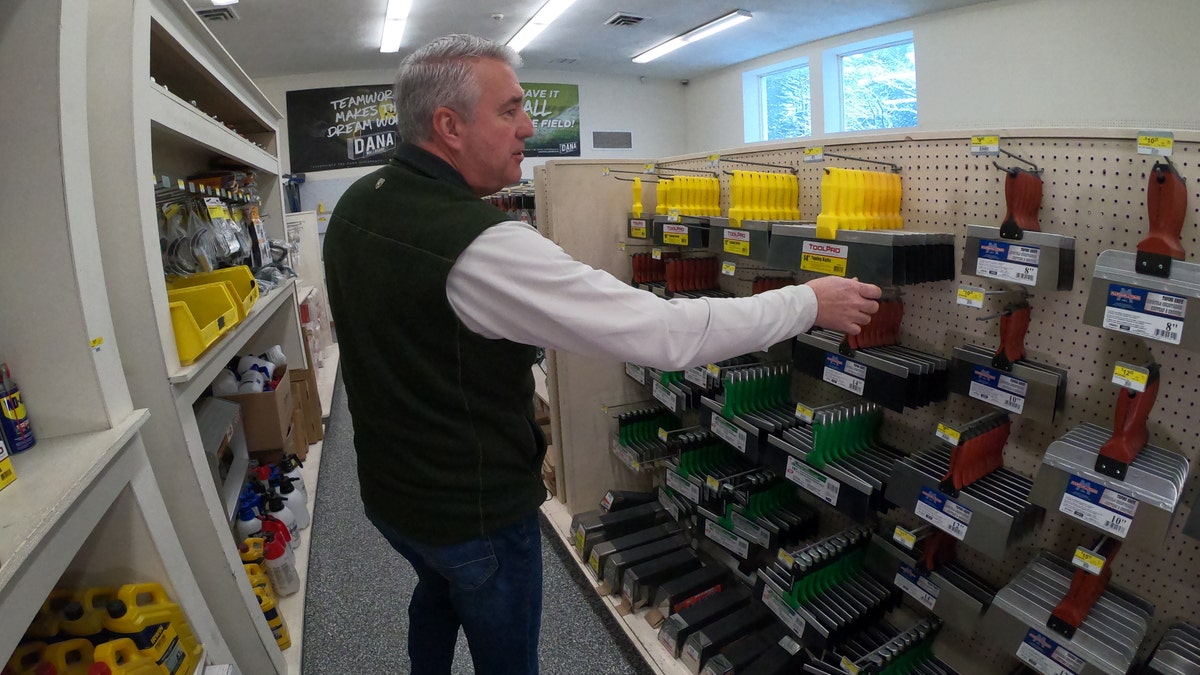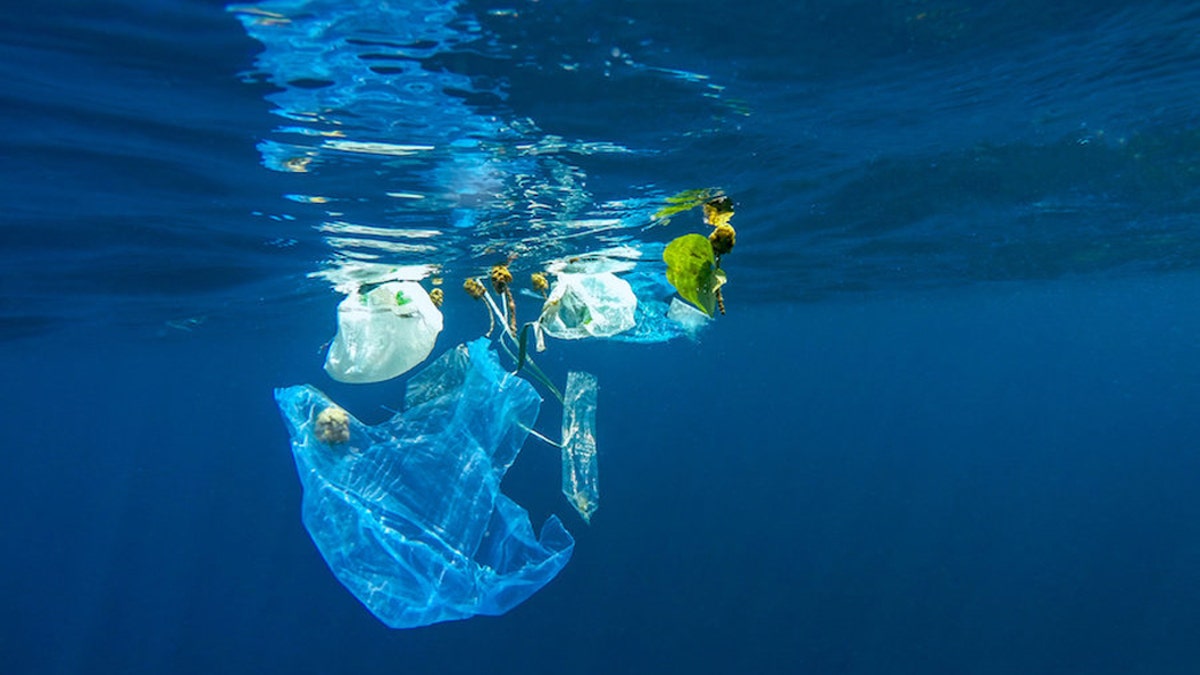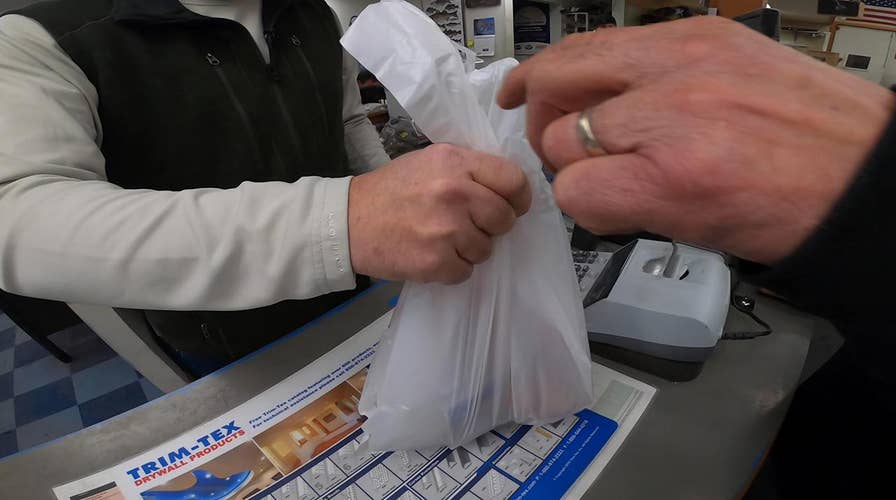Massachusetts, New Jersey move closer to plastic bag bans
The two states would join eight others in banning plastic bags altogether in an effort to cut pollution. Meanwhile, some small business owners are calling foul.
BOSTON – Paper or plastic?
Soon, shoppers in Massachusetts and New Jersey may not have a choice.
Both states' legislatures have been moving closer to banning plastic bags in an effort to cut down plastic pollution. Eight states – California, Connecticut, Delaware, Hawaii, Maine, New York, Oregon and Vermont — already have approved bans on single-use plastic bags, according to the National Conference of State Legislatures.
The Massachusetts bill would make stores charge 10 cents per paper bag – while legislators in New Jersey have been considering banning paper to boot.
DEADLIEST PLASTIC TRASH INGESTED BY SEABIRDS REVEALED IN NEW STUDY
"It's kind of like water torture. It's like this drip, drip, drip of taxes," said John Sullivan, the owner of Dana Wallboard, a hardware and contractor supply store in the town of Tyngsborough in northern Massachusetts.

John Sullivan, the owner of Dana Wallboard in Tyngsborough, Mass., said paper bags just won't cut it for a lot of the tools he sells. (Fox News/Rob DiRienzo)
Sullivan said that while he agreed plastic pollution has been an issue, he dreaded slapping his customers with another fee. The store, which has been in business for 44 years, is less than two miles from the New Hampshire border. Sullivan said he feared that eventually, his customers will start driving a few minutes more to the north into the next state to save themselves the hassle.
"Our competitors don't have to figure out how they'll have to pay for these taxes," Sullivan said of his New Hampshire counterparts, which also don't have a sales tax. "They don't have to pass it on to the consumer. We typically do."
MISSOURI LAWMAKER WANTS TO STOP LOCAL PLASTIC BANS: 'LET'S KEEP GOVERNMENT OUT OF IT'
Of the 10-cent fee, five cents would go to the city or town for enforcement of the ban and other municipal recycling efforts. The other half would go to the retailer to cover the cost of paper bags. Under the New Jersey proposal, municipal health inspectors would enforce the bans and if a store was caught using paper bags twice, it would be hit with a fine of up to $1,000.
Environmentalists have argued the plastic problem deserved a swift response.
"The mass of plastic in the ocean worldwide in the ocean by 2050 will exceed the mass of fish," said Jardayna Werlin, the chairwoman of the Massachusetts chapter of Surfrider Foundation, an ocean environmental protection group, citing a 2017 study by the United Nations. "That's a really scary thing as a parent and as an ocean lover."

Plastic pollution has become a growing and growing problem, environmentalists have warned. (aryfahmed / Adobe Stock, File)
Werlin denied the plastic bag ban would have any serious impact on small businesses, pointing to the city of Boston and more than 100 other communities in Massachusetts that already had a similar rule in effect.
"Plastic bags as a free thing at point-of-sale are not really free," Werlin said. "They get wrapped into the cost to the consumer anyway. [...] Having that fee in place is crucial and allows the business owners to recoup if they do have increased costs for having to provide paper bags," she said.
Sullivan had a completely different idea – he said a bag deposit would make more sense.
CLICK HERE TO GET THE FOX NEWS APP
"It's an incentive to pick these things up," Sullivan said. "If you want, you can go scoop up cans and bottles and bring them back to the store and get your money back. Well, why not do that with plastic bags?"
In California, which has had a plastic bag ban on the books since 2016, many stores still have used plastic bags due to a loophole, the San Francisco Chronicle reported. While the bags were thicker and meant to be reusable, they often have been thrown away after a single transaction, according to the report.
The Associated Press contributed to this report.













































